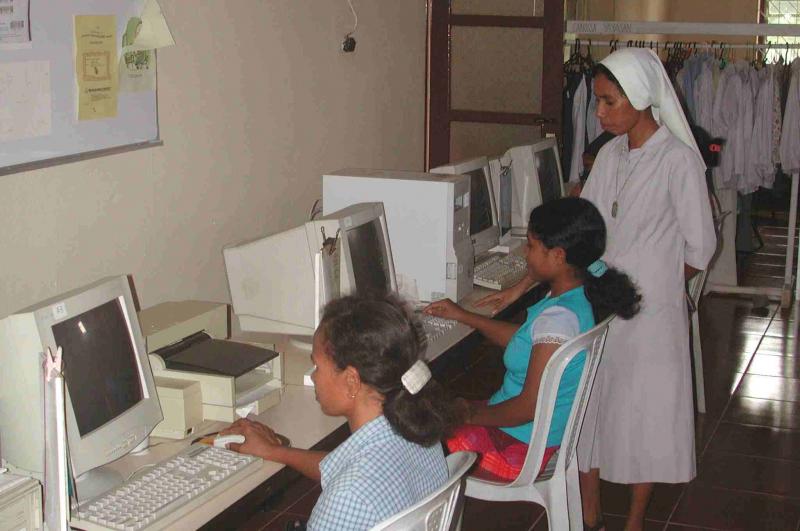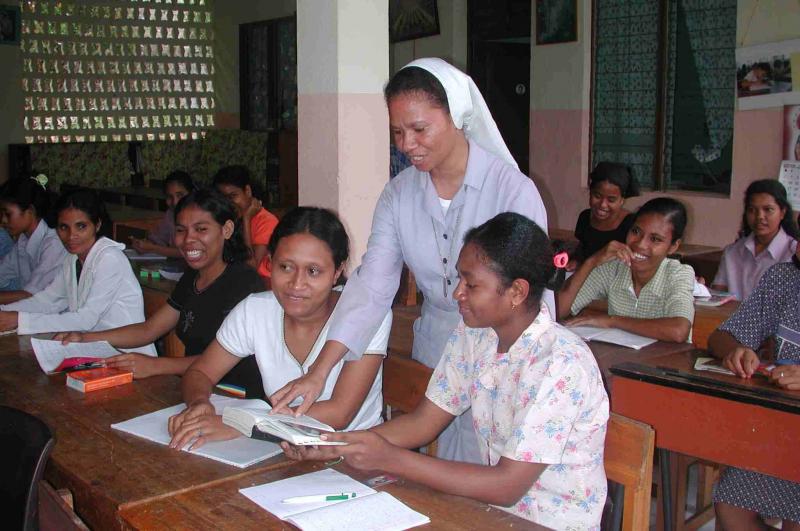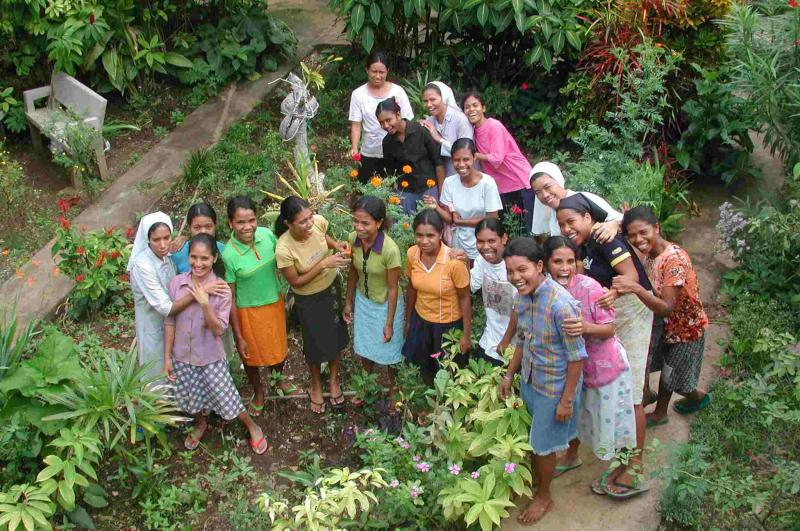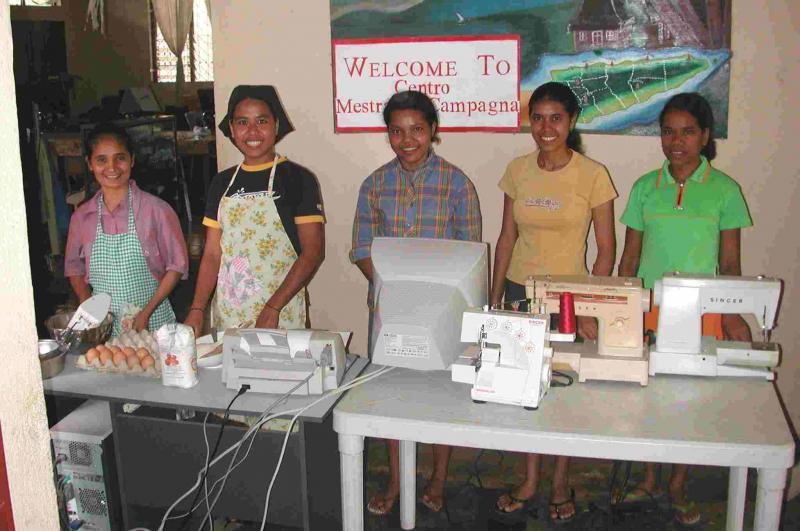‘Maestra di Campagna’
By Sister Sonia Sangel FdCC
‘If everyone lit just one little candle, what a bright world this would be!’

This is what my heart was singing as I began my mission in East Timor a few months after the war in 1999, my second mission ad gentes – ‘to the nations’ – after six adventurous years in Papua New Guinea. I wished to be one of many who might light just one little candle, particularly in the world of women. Women constitute 49.5 % of the population of East Timor. By their sheer number alone they can be looked upon as key economic and social agents in this newly born, struggling nation.
Stereotyped
Many East Timorese don’t yet seem to fully appreciate the right of children, particularly of girls, to education as a vital factor towards self-actualization, giving them access to possible key decision-making positions in both governmental and non-governmental institutions. A multitude of traditional practices and the absence of laws in this area make the identification of women’s needs and capacities, as well as their promotion, difficult. This is the darkness of the world of women in which a tiny candle needs to be lit.
Empowering women
About 80 Canossian Sisters engaged in formal and non-formal education, evangelization, pastoral and health work, assist men and women in all age groups to develop themselves to take an active part in the building up of the Church and nation. However, in all the communities, we minister to women in a special way through seven students’ boarding homes and on-the-job training for women working side by side with the Sisters, and the handicraft skills training conducted for many groups of girls and women. In Baucau, together with the young Timorese Sisters of my community, I started one of the typical pet projects of St Magdalene, our Foundress, which is still very relevant and fruitful, the ‘Maestra di Campagna’ or ‘Rural-Teachers’ Training.’

Women aged between 19 and 40 from different villages and districts of this small country, on the recommendation of the parish priest, community leaders or Sisters, attend the six-month, stay-in training. St Magdalena admonished the Sisters to ‘commit themselves to the formation of women’ so that ‘by helping the country women, they become guides and animators of their local ecclesial communities.’ So we, the Sisters, exert joint efforts, and with enthusiasm and zeal, dedicate ourselves to this training. The course entails: Leadership Training, Catechism, Music, Spoken English and Skills in: Computer Literacy, Sewing and Embroidery, Cooking and Baking, and Organic Gardening. The Timorese Sisters and lay staff take charge of the Catechesis, Sewing and Embroidery, Cooking and Baking, while I teach English, Computer Literacy, and Organic Farming, which is my magnificent obsession. However, my main task is to keep the program running by securing funds. Thank God the ‘well never runs dry.’ It is always replenished by good friends and benefactors.
At the end of the six-month training, we aim to produce empowered, responsible and skilled women capable of loving themselves and others, committed to their mission in the local Church. These women are qualified for employment in the community, or for self-employment while upholding the importance of basic education and the dignity of labor.
What happens after the training? What becomes of these women?

Here are some of their testimonies.
I am Elda. I belong to the first group of ‘Maestra di Campagna’. At the beginning, I was hesitant to accept the offer of our Parish Priest, Fr Locatelli SDB, to attend the course. The trauma of war is still in my senses and to live away from home gave me some insecurity. Yet, I trusted that the training would give me a brighter future. I have a dream to work for and serve the people in our little village. So, I attended the training. It was a period of adjustment, of insertion in a group and of discovery of myself and the community. I learned to trust myself and to be available for the service of the community. Now I have a group of women to whom I teach catechism and sewing. It gives me a sense of dignity to work for my living while empowering other women too.
I’m Christine. I learned to cook and bake. Right after the training, my colleague, Nicolina, and I got work as assistant chefs at the airport in Baucau. We cook the meals for pilots, engineers, medical teams and aircraft crews coming from all over the Pacific and Asia. It is challenging work where I learn to become more creative in cooking every day. I feel satisfied to see everyone happy at mealtimes. On weekends Nicolina and I give our time to our local community, especially for the formation of youth.
I’m Georgina, the mother of two children. The skill I learned best in the training is sewing. My two little children keep me at home. Thanks to the Sisters who gave me a sewing machine, I sew some dresses, aprons and trousers while my children are asleep. I’m happy to have an income which I can use to buy milk for them.
I’m Jacquelina. I’ve always wanted to become a professional working in an office. But I was not quite sure whether this would come true since my family had no means to finance a tertiary education for me. Providentially, my aunt who helped the Sisters to repair their sewing machines, encouraged me to take the ‘Maestra di Campagna’ course. Amazing! When I began to use the computer, ‘My dream seems to have come true.’ I felt my dignity and self-esteem. My teacher saw my keenness in Computer Literacy. I also made good progress in English. Now I am employed as a secretary in Canossa Foundation, Dili. I do computer work, keep correspondence in English and Bahasa Indonesia and do the bookkeeping. I also attend NGO forum meetings as representative of the Canossa Foundation. Thanks to the good Lord and to the Sisters who have helped me become what I am now.

Indeed, education, whether formal or non-formal, is a way of preparing persons to take roles in society. . . a kind of transformation happens within a person where she feels empowered with self-worth and confidence, and does things not only for herself but also for the common good. This is the little candle which we try to light in our own way…in the way inspired by St Magdalene, our Mother and Foundress.
Lastly, I wish to thank all our friends and benefactors and our Director who generously and enthusiastically support the training in ‘Maestra di Campagna.’ They too light little candles to brighten the world.
